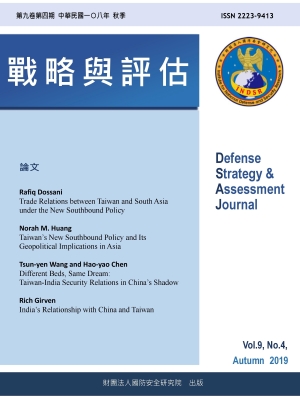Taiwan’s New Southbound Policy and Its Geopolitical Implications in Asia
2019.12.06
Views
146
Author:
Associate research fellow/Director International Studies, Prospect Foundation
Norah M. Huang
Abstract
When presidential candidate Tsai Ing-wen declared her commitment to promote a New Southbound Policy (NSP) during her campaign and after she took office as president, there was no shortage of critics citing failed southward-looking policies in previous Lee and Chen presidency. Might this time be different? It appears there are some contexts, both economic and political, that might lead to different outcomes this time around. Chinese president Xi has shown more willingness to weaponize its market and to coerce trading partners for adopting policies that do not fits China’s interest. This creates incentives for countries in Southeast and South Asia, like Taiwan, South Korea and others, to diversify trading network and reduce economic dependence on China. On the other hand, the US redefines China as its major national security threat and adopts tougher competition policy toward China including attempts to correct China’s unfair trade practices with mounting tariffs. Gradually it leads to companies moving their production sites out of China to Southeast and South Asia, areas where most of the 18 New Southbound Policy target countries locates. Against the backdrops, Taiwan’s New Southbound Policy has better opportunities to success by providing alternative partnership to Asian countries and may introduce geopolitical implications along.
PDF Link:
Image Source: CNA

